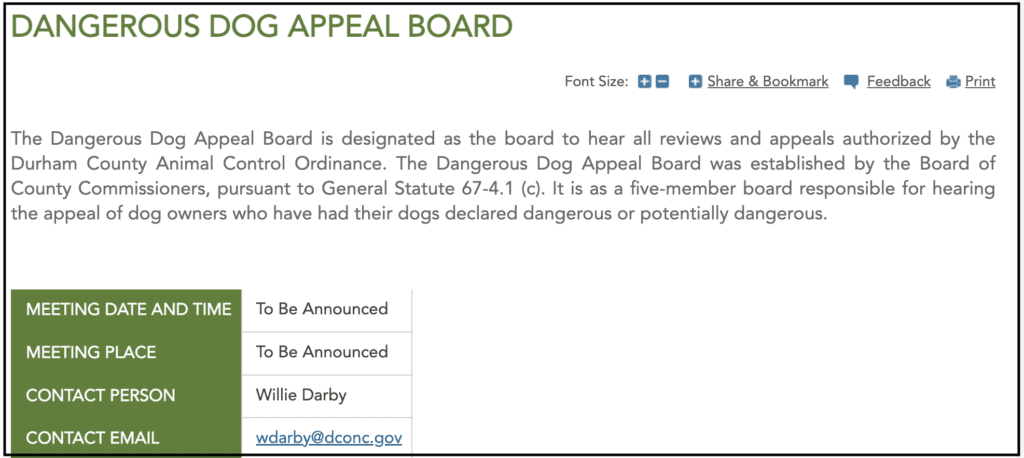On Dec. 2, 2021, Jazmine Bunch had a small birthday celebration for Stormi, her Maltese/Yorkie mix. The dog wore a pink party hat and got a dog-friendly cake. A few hours later, Bunch took Stormi to a dog park, where she got loose and encountered a gray pit bull named Savvi-Blue that attacked her.
Bunch rushed her dog to the vet, but it was too late. Stormi had died.
A day later, the Animal Services Division of the Durham County Sheriff’s Office dispatched Deputy Ashley Coward to investigate. She collected photos, medical reports, vaccination records and witness statements to determine the level of risk posed by the dog. The conclusion: Savvi-Blue was “potentially dangerous.”

Sometimes, the dog’s owner challenges the determination that their dog is dangerous or potentially dangerous, which prompts the involvement of the Dangerous Dog Appeal Board.
The five-member board is responsible for hearing the appeals of owners who have had their dogs declared dangerous or potentially dangerous. Of these five members, one must be in the veterinary business and no more than two can be employees of the government.
The board is supposed to meet within 30 days of an appeal, although the schedule seems to have frequent delays. The five board members sit before the owner of the dog in question on Microsoft Teams, a video platform similar to Zoom. The dog owner appealing the decision presents evidence explaining why the decision should be overturned and the sheriff’s deputy presents the evidence that led to the initial accusation.
Think of it as a dog court. After roughly an hour of discussion, a conclusion is made: Does this dog pose a threat?
That decision is complicated, a process that involves a thick packet of witness statements, photographs and evidence.
To understand the work of the board, The 9th Street Journal examined six recent cases from 2021 and 2022. They involved dog-on-dog or, in one case, dog-on-chicken, attacks. Like some other citizen boards we’ve examined in our Under the Radar series, dog court is not very transparent. Its website offers an outdated contact and such sketchy details that we had to file public records requests to obtain information about recent cases.

Motiryo Keambiroiro, a former director for Durham County General Services who is one of the senior members of the board, said the group gets four to six appeals per year. Their approach is to engage the community “on both sides of the fence,” she said.
But a review of recent cases shows the process can also leave bitter feelings. Owners of some of the attack victims said watching the board overturn the “potentially dangerous” designation can be a cold and insensitive process.
***
In the case of Savvi-Blue, her owner, Necole Hope, argued that her dog did not instigate the encounter, and therefore did not deserve to be deemed potentially dangerous. In her written statement, she recalled that Stormi “got through the gate and ran toward us.”
But when Bunch described the event, she claimed that Savvi-Blue was “barking and pulling at the leash” which caused her dog, Stormi, to bark back and slip through the fence toward Hope’s two dogs, “as if playing with and greeting them.”
Some facts were indisputable, though: Ultimately, Savvi-Blue caused severe wounds that killed Stormi.
Bunch, who had endured the death of her dog, arrived at a virtual meeting on Dec. 22, 2021 that was immediately canceled because the case officer for the incident was not available that day.
The video recording of this meeting shows Willie Darby, an attorney for the county and member of the board at the time, behaving jovially during the serious proceedings. At one point, he asked if they were “in the midst of a superstar,” referring to Necole Hope, the owner of the dog who killed Stormi, because Hope played basketball for North Carolina Central University. Darby shouted, “my alma mater!” as other members of the board whooped and laughed. One board member put two thumbs ups toward her camera and smiled.
Bunch is still miffed about that. “It’s not just an animal. That was my dog, and nobody is taking it seriously” said Bunch, a 24-year-old video editor at Warner Bros. Discovery, growing emotional on the phone.
Bunch said that she felt the board was biased. “There was essentially nobody on my side, rooting for me.”
Also frustrating to her: The hearing was postponed twice without formal explanation, and without a new date in sight. “I have to take off work for this,” she said.
Eventually, the postponements became too much for her. “I was traumatized enough… I didn’t even care to know what was next,” said Bunch. She alerted the board that she did not wish to attend any further meetings, and was later informed of the verdict via email. The board overturned the sheriff’s determination that Savvi-Blue was “potentially dangerous.”
Mimi Davis, a Duke University research administrator and a member of the board, acknowledged that Willy Darby’s comment was strange. In response to Bunch’s complaints, Davis said, “It was an awkward moment simply because the person whose dog was injured – killed – expressed that she didn’t like the interaction.”
Davis said that the tone of each meeting “literally depends on the people involved” and that each process is case-by-case.
Despite this explanation, Bunch remains disgruntled.
***
Another dog owner, Nancy Gray-Terry, said the board was disorganized when it considered the case of Buddy, her mini-dachshund poodle mix that was injured by Bella, a boxer mix.
The attack occurred when Buddy was being walked by Pradeepraj Krishnappa Babu, a postdoctoral researcher at Duke, in January 2022.

Krishnappa Babu was neighbors with Gray-Terry. She remembers him being afraid of many dogs, but “my little guy decided to befriend him,” she said, referring to the special bond he shared with Buddy.
One day, Krishnappa Babu was walking Buddy down Orient Street when a dog slowly approached them from a nearby house and became violent.
“Before I could lift Buddy completely in my hand, it had grabbed his belly,” Krishnappa Babu wrote in his statement to the board.
The attack caused severe damage to Buddy’s abdomen and led to major surgery. It was so expensive that Gray-Terry set up a GoFundMe page. Although Buddy survived the attack and surgery, he died a few months later from cancer, which Gray-Terry suspects spread as a result of the attack.
A sheriff’s deputy investigated and determined Bella was potentially dangerous. In a letter addressed to Ashley Carr who was listed as Bella’s owner, the office of the sheriff wrote, “our investigation has shown sufficient evidence to prove that the dog described above, while being off your property, attacked and injured ‘Buddy.’” Carr appealed on a technicality saying she did not live at that address.
When Gray-Terry arrived at her virtual hearing, the woman representing the accused dog denied that the dog was hers. This led to confusion. “It was kinda like the homework had not been done,” Gray-Terry said.
When the committee realized that Carr, the supposed owner, was not in attendance, a woman named Christine Miller unmuted herself and explained that Bella was Carr’s dog, but had been in Miller’s possession due to Carr’s inability to care for Bella. Darby felt comfortable proceeding: “Someone is claiming ownership… so let’s go with the hearing and see where we end up,” he said, according to a recording of the meeting.
The board and Sheriff’s Deputy Wendy Pinner, the investigator on the case, then had opportunities to ask questions of both dog owners. After roughly an hour of questioning and collecting evidence, it was time for closing statements.
Miller went first. “I have no argument,” she said. “I’m devastated at what happened to their dog… But other than that, I have no argument. I rest… or whatever. Thank you.” She was crying, her camera held close to her face showing her teary eyes, blue hair and the moving scenery behind her, as she was in the passenger’s seat of a car.
The board then went into a separate, private meeting to deliberate and decide the case. When they returned to the public Microsoft Teams room, the witnesses and dog owners had left. The board had forgotten to ask them to stay.
The verdict: The board upheld the deputy’s decision that Bella was potentially dangerous.
Now, months later, Krishnappa Babu and Gray-Terry said they were not satisfied with the process. It was disorganized, they said, and they weren’t convinced it made a difference. When Krishnappa Babu walked by the house where Buddy was attacked, he did not see the required warning sign.
Gray-Terry reflects on her experience with the Dangerous Dog Appeals Board as “kinda like a waste of time.”
***
When asked about these criticisms of the board, County Attorney Alan Andrews told The 9th Street Journal, “I will do all within my power to ensure that these proceedings are conducted with decorum and due regard for the seriousness of the matters at hand.”
Photo at top: Stormi, who died on her 1st birthday after being attacked by Savvi-Blue. After Savvi-Blue was determined to be “potentially dangerous,” the owner appealed to dog court. Photo courtesy of Jazmine Bunch.
Jacqueline Cole





